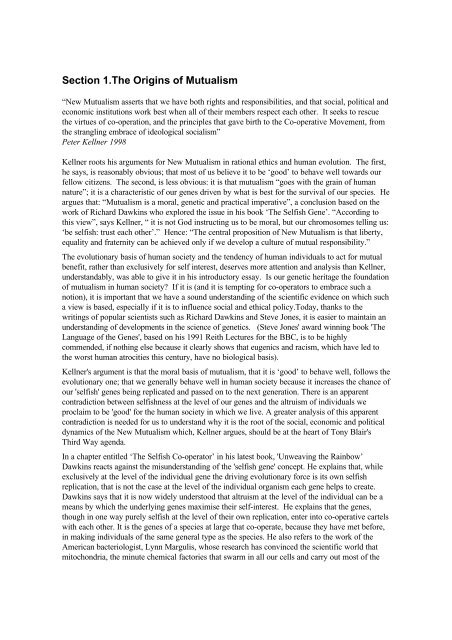New Mutualism - The Third Estate - CDS Co-operatives
New Mutualism - The Third Estate - CDS Co-operatives
New Mutualism - The Third Estate - CDS Co-operatives
- No tags were found...
You also want an ePaper? Increase the reach of your titles
YUMPU automatically turns print PDFs into web optimized ePapers that Google loves.
Section 1.<strong>The</strong> Origins of <strong>Mutualism</strong><br />
“<strong>New</strong> <strong>Mutualism</strong> asserts that we have both rights and responsibilities, and that social, political and<br />
economic institutions work best when all of their members respect each other. It seeks to rescue<br />
the virtues of co-operation, and the principles that gave birth to the <strong>Co</strong>-operative Movement, from<br />
the strangling embrace of ideological socialism”<br />
Peter Kellner 1998<br />
Kellner roots his arguments for <strong>New</strong> <strong>Mutualism</strong> in rational ethics and human evolution. <strong>The</strong> first,<br />
he says, is reasonably obvious; that most of us believe it to be ‘good’ to behave well towards our<br />
fellow citizens. <strong>The</strong> second, is less obvious: it is that mutualism “goes with the grain of human<br />
nature”; it is a characteristic of our genes driven by what is best for the survival of our species. He<br />
argues that: “<strong>Mutualism</strong> is a moral, genetic and practical imperative”, a conclusion based on the<br />
work of Richard Dawkins who explored the issue in his book ‘<strong>The</strong> Selfish Gene’. “According to<br />
this view”, says Kellner, “ it is not God instructing us to be moral, but our chromosomes telling us:<br />
‘be selfish: trust each other’.” Hence: “<strong>The</strong> central proposition of <strong>New</strong> <strong>Mutualism</strong> is that liberty,<br />
equality and fraternity can be achieved only if we develop a culture of mutual responsibility.”<br />
<strong>The</strong> evolutionary basis of human society and the tendency of human individuals to act for mutual<br />
benefit, rather than exclusively for self interest, deserves more attention and analysis than Kellner,<br />
understandably, was able to give it in his introductory essay. Is our genetic heritage the foundation<br />
of mutualism in human society? If it is (and it is tempting for co-operators to embrace such a<br />
notion), it is important that we have a sound understanding of the scientific evidence on which such<br />
a view is based, especially if it is to influence social and ethical policy.Today, thanks to the<br />
writings of popular scientists such as Richard Dawkins and Steve Jones, it is easier to maintain an<br />
understanding of developments in the science of genetics. (Steve Jones' award winning book '<strong>The</strong><br />
Language of the Genes', based on his 1991 Reith Lectures for the BBC, is to be highly<br />
commended, if nothing else because it clearly shows that eugenics and racism, which have led to<br />
the worst human atrocities this century, have no biological basis).<br />
Kellner's argument is that the moral basis of mutualism, that it is ‘good’ to behave well, follows the<br />
evolutionary one; that we generally behave well in human society because it increases the chance of<br />
our 'selfish' genes being replicated and passed on to the next generation. <strong>The</strong>re is an apparent<br />
contradiction between selfishness at the level of our genes and the altruism of individuals we<br />
proclaim to be 'good' for the human society in which we live. A greater analysis of this apparent<br />
contradiction is needed for us to understand why it is the root of the social, economic and political<br />
dynamics of the <strong>New</strong> <strong>Mutualism</strong> which, Kellner argues, should be at the heart of Tony Blair's<br />
<strong>Third</strong> Way agenda.<br />
In a chapter entitled ‘<strong>The</strong> Selfish <strong>Co</strong>-operator’ in his latest book, 'Unweaving the Rainbow’<br />
Dawkins reacts against the misunderstanding of the 'selfish gene' concept. He explains that, while<br />
exclusively at the level of the individual gene the driving evolutionary force is its own selfish<br />
replication, that is not the case at the level of the individual organism each gene helps to create.<br />
Dawkins says that it is now widely understood that altruism at the level of the individual can be a<br />
means by which the underlying genes maximise their self-interest. He explains that the genes,<br />
though in one way purely selfish at the level of their own replication, enter into co-operative cartels<br />
with each other. It is the genes of a species at large that co-operate, because they have met before,<br />
in making individuals of the same general type as the species. He also refers to the work of the<br />
American bacteriologist, Lynn Margulis, whose research has convinced the scientific world that<br />
mitochondria, the minute chemical factories that swarm in all our cells and carry out most of the







